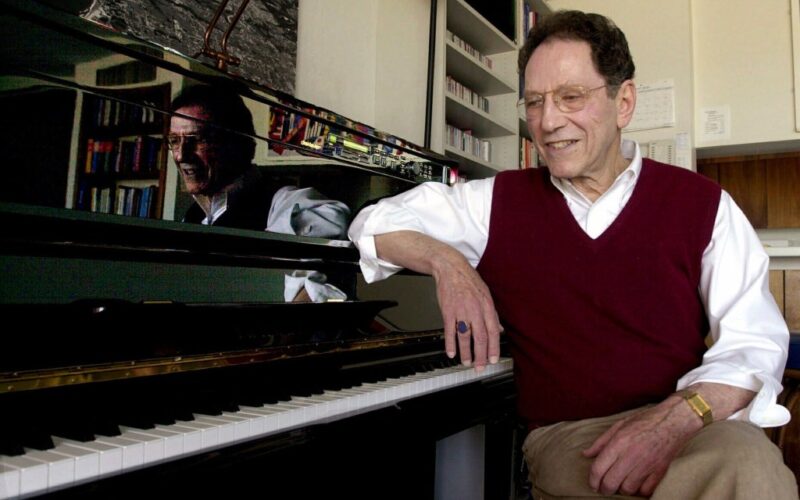Tom Lehrer, the musical satirist and onetime mathematical prodigy whose lampooning lyrics skewered racism, the Catholic Church, marriage and the Cold War and many other topics, has died.
He was 97.
Friends told Variety that Lehrer had been found dead in his home on Saturday, and longtime friend David Herder confirmed to The Associated Press the retired performer and college professor had died at home in Cambridge, Mass., of undisclosed causes.
He had a dual career as satirist and as a mathematics professor at Harvard University and the University of California Santa Cruz, teaching math and musical theater at the latter until well into his 70s.
Lehrer was born in Manhattan on April 9, 1928, and was enamored with the piano, beginning his study at age 7. He was just as captivated by math, entering Harvard University as a prodigy when he was 15 and earning a bachelor’s degree by 18. The next year he got his master’s there as well, but never finished his PhD.
His musical career happened almost by accident, and he wrote song parodies throughout his student years to amuse himself and his friends, recording his first as an undergrad at 17. “Fight Fiercely Harvard” was a sendup of how he imagined a clench-jawed Harvard snob might deliver a football fight song, and it became a university football-game staple for decades.
During the 1950s Lehrer began performing in nightclubs and at university parties, and in 1953 recorded his first album, “Songs of Tom Lehrer.” The surprise hit sent him across the country, where he packed nightclubs and concert, his fame spreading “not like Ebola, but like herpes,” as Lehrer used to quip.
In the early ’50s he worked for the Atomic Energy Commission, then enlisted in the U.S. Army (a move that inspired “It Makes a Fellow Proud to Be a Soldier”), working secretly for the National Security Administration from 1955 to ’57. The two-year stint “influenced much of his musical repertoire,” according to Task and Purpose.
He recorded a second album, “More of Tom Lehrer,” in 1959 after leaving the army, as well as a live version “An Evening Wasted With Tom Lehrer.”
Evening Standard/Hulton Archive/Getty Images
Tom Lehrer in 1966. (Photo by Evening Standard/Hulton Archive/Getty Images)
Lehrer’s gift lay in pairing his often dark lyrics with peppy melodies in the lighthearted musical style of Gilbert and Sullivan or Stephen Sondheim. Nothing was off-limits, not even anti-war protest songs. His albums have sold millions of copies, and the songs have cropped up on such TV dramas as “Picket Fences” and “Chicago Hope.”
Sometimes the pairing was literal and evoked his scientific background, as in “The Elements,” in which he matched the chemical names in the Periodic Table to the Gilbert and Sullivan classic from “The Pirates of Penzance,” “I Am the Very Model of a Modern Major-General.”
Catholic and Protestant religious leaders attacked what one called his “sacrilegious, blasphemous and insulting” work in 1967 after a Putnam Valley, N.Y., teacher played “National Brotherhood Week” (which lampooned racism and hypocrisy) and “The Vatican Rag” (which mocked Catholic rituals) for her students, The New York Times reported at the time.
“The material is of the lowest type, originally being recorded in a night club and presenting religious ideas in the worst form,” the Rev. Louis G. Elgert of St. Luke’s Lutheran Church of Putnam Valley said on behalf of a dozen church officials and 200 parishioners. “We suggest that the teacher be censured.”
Officially retiring from the performance part of his career in the early 1960s, Lehrer continued to write behind the scenes, composing songs for “That Was the Week That Was,” an NBC satire comedy show. He recorded the songs himself on what would be his last album, “That Was the Year That Was.”
About 30 years after that he dipped into the then-newfangled online world with a live chat coinciding with Rhino Records’ re-release of his two 1950s albums. The 50 songs he wrote have been translated into nine languages and recorded by Bing Crosby and Tiny Tim, among others.
Lehrer influenced subsequent generations of comics, inspiring Harry Shearer of “This Is Spinal Tap” and “The Simpsons” fame, and “Weird Al” Yankovich, who on Saturday paid tribute to his “musical hero.”
“He established this genre of comedy songwriting,” musical satirist and “Crazy Ex-Girlfriend” star Rachel Bloom told the Washington Post, explaining that he took “established genres and flip[ped] them on their head.”
With News Wire Services
Originally Published:








